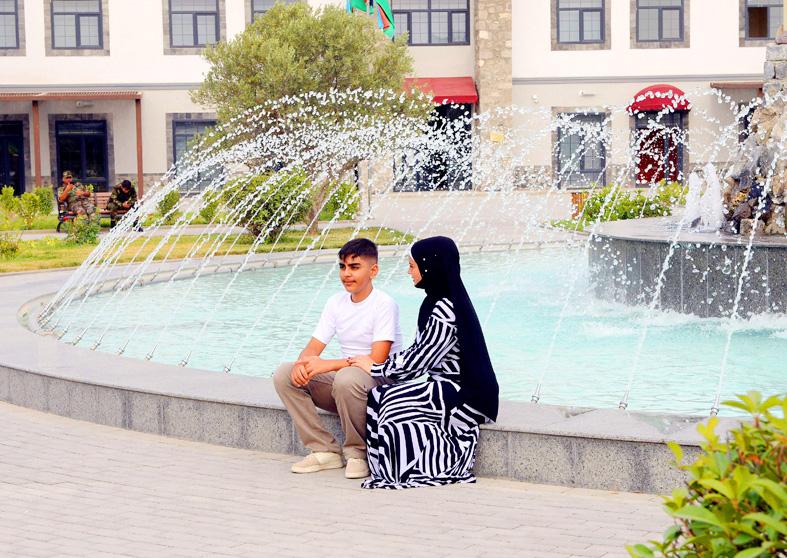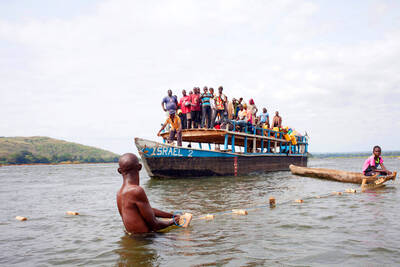Azerbaijan on Tuesday began the process of returning its people to land recaptured from Armenian separatists in what Baku calls “the great return” following a 2020 war over disputed Nagorno-Karabakh.
Azerbaijan has vowed to repopulate lands recaptured in the six-week war with Caucasus neighbor Armenia that killed more than 6,500 people two years ago.
Azerbaijani President Ilham Aliyev had for years promised to retake lands lost in the 1990s and the first returns marked a symbolic moment for Azerbaijan.

Photo: AFP
An official said that almost 60 people moved back to a village they had to flee in 1993, when ethnic Armenian separatists broke away from Baku, triggering a conflict that claimed about 30,000 lives.
Hundreds of thousands of Azerbaijanis quit the area during the fighting.
“Fifty-eight people returned to the district of Zangilan” recaptured by Baku in October 2020, said Vahid Hajiyev, special presidential representative in the region.
More than 30,000 ethnic Azerbaijanis fled Zangilan, near the Iranian border, in 1993.
“At this stage, a total of 41 families will return” over the next five days to the newly rebuilt village of Agally in Zangilan, Hajiyev said.
The government would provide jobs for the returnees, he said.
It has already built in Agally dozens of houses equipped with solar batteries, a brand new school and a kindergarten, he said.
“Over the next months the village will be fully repopulated,” he added.
Emotions ran high as repatriates stepped down from buses in Agally’s windswept central square, where a new fountain sparkled under a sweltering sun.
“We are so happy to be back,” one of the returnees, 64-year-old Mina Mirzoyeva, told reporters. “This is our homeland, our native land.”
Rahilya Ismayilova, 72, said that in 1993 she had been forced to ford a river into Iran with her small children, fleeing for life from the Armenian separatist forces.
“May all the refugees return to their homes, just as we did today,” she said. “I fled my village with my four children and today I am back with my big family, with my nine grandchildren.”
Baku has vowed to spend billions of dollars on the reconstruction of Nagorno-Karabakh and nearby recaptured areas.
It allocated US$1.3 billion in last year’s budget for infrastructure projects such as new roads, bridges and airports in the region.
However, a large-scale return of refugees remains a distant prospect given the scale of the devastation and the danger from landmines.
In the autumn of 2020, Azerbaijan and Armenia went to war for a second time for control of Karabakh. The fighting ended with a Russian-brokered ceasefire agreement.
Under the deal, Armenia ceded swathes of territory it had controlled for decades and Russia deployed about 2,000 peacekeepers to oversee the fragile truce.
The chair of Armenia’s security council, Armen Grigoryan, on Tuesday said that Yerevan’s forces would complete their withdrawal from areas that had been under separatist control by September.
This weekend, the foreign ministers of Armenia and Azerbaijan met in the Georgian capital, Tbilisi, for their first one-on-one talks since the war.
They were expected to build on an agreement which Aliyev and Armenian Prime Minister Nikol Pashinyan reached under EU mediation in May to “advance discussions” on a peace treaty.
The two leaders met in Brussels in April and May, and European Council President Charles Michel has said their next meeting is scheduled for this month or next month.
Following its invasion of Ukraine on Feb. 24, Moscow lost its status as the primary mediator in the conflict.
The EU has since then led the Armenia-Azerbaijan normalization process, which involves peace talks, border delimitation and the reopening of transport links.

‘IN A DIFFERENT PLACE’: The envoy first visited Shanghai, where he attended a Chinese basketball playoff match, and is to meet top officials in Beijing tomorrow US Secretary of State Antony Blinken yesterday arrived in China on his second visit in a year as the US ramps up pressure on its rival over its support for Russia while also seeking to manage tensions with Beijing. The US diplomat tomorrow is to meet China’s top brass in Beijing, where he is also expected to plead for restraint as Taiwan inaugurates president-elect William Lai (賴清德), and to raise US concerns on Chinese trade practices. However, Blinken is also seeking to stabilize ties, with tensions between the world’s two largest economies easing since his previous visit in June last year. At the

UNSETTLING IMAGES: The scene took place in front of TV crews covering the Trump trial, with a CNN anchor calling it an ‘emotional and unbelievably disturbing moment’ A man who doused himself in an accelerant and set himself on fire outside the courthouse where former US president Donald Trump is on trial has died, police said yesterday. The New York City Police Department (NYPD) said the man was declared dead by staff at an area hospital. The man was in Collect Pond Park at about 1:30pm on Friday when he took out pamphlets espousing conspiracy theories, tossed them around, then doused himself in an accelerant and set himself on fire, officials and witnesses said. A large number of police officers were nearby when it happened. Some officers and bystanders rushed

Beijing is continuing to commit genocide and crimes against humanity against Uyghurs and other Muslim minorities in its western Xinjiang province, U.S. Secretary of State Antony Blinken said in a report published on Monday, ahead of his planned visit to China this week. The State Department’s annual human rights report, which documents abuses recorded all over the world during the previous calendar year, repeated language from previous years on the treatment of Muslims in Xinjiang, but the publication raises the issue ahead of delicate talks, including on the war in Ukraine and global trade, between the top U.S. diplomat and Chinese

RIVER TRAGEDY: Local fishers and residents helped rescue people after the vessel capsized, while motorbike taxis evacuated some of the injured At least 58 people going to a funeral died after their overloaded river boat capsized in the Central African Republic’s (CAR) capital, Bangui, the head of civil protection said on Saturday. “We were able to extract 58 lifeless bodies,” Thomas Djimasse told Radio Guira. “We don’t know the total number of people who are underwater. According to witnesses and videos on social media, the wooden boat was carrying more than 300 people — some standing and others perched on wooden structures — when it sank on the Mpoko River on Friday. The vessel was heading to the funeral of a village chief in